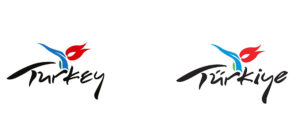Can Turkey be rebranded in one PR move?

After decades of unsuccessful attempts, the country that straddles Europe and Asia Minor is once again launching a worldwide campaign to change its name.
Turkish president Recept Tayyip Erdogan’s government wants to shift the 80-million population country’s image into a more positive position. Turkey’s nation branding managers see the presently-used name of “Turkey” as derogatory, evoking images of birds and people with laughable qualities.
But the effort is already seeing that nation rebranding is fraught with challenges.
The country formerly known as Turkey is launching a PR push to get people to call it “Türkiye” in English, including the use of the double-dot trema/ umlaut,which exists in some Latin-based alphabets but not in others. Then add the confusion of pronouncing the “iye” vowel blend.
The letters and pronunciation are not the only difficulties: the name and the associations of human rights violations and interference with neighboring borders will not just wash off with a correction of the name’s spelling. This is the generations-old branding of an entire country and its peoples, not the correction of a typo error.
The country has already made official declarations of the name change, telling the U.S. government, The United Nations, and NATO that the official name from June 2022 is “Türkiye”. The task of convincing people walking in the streets around the world may prove a greater challenge.
Announcements were name that the national airline will also be changed from Turkish Airlines to “Türkiye Hava Yolları” though President Erdogun’s office later seemed to backtrack on that decision.
The country’s name has origins in fact in the bluish stone turquoise that has been imported by Europeans through Asia Minor for centuries, though the actual stone quarries are located in modern-day Iran. It also carries associations with the turquoise blue-green waters of the Aegean coastline.
As Turkey has learned from previous failed attempts by export associations in the late 1990s, branding has some basic rules that branding managers do not have full control of:
- Nation branding is often something that is often imposed by others. Simply think of the original etymology of branding, meaning to burn onto an object: the horse does not choose the brand that is burned onto its hide. The brand is burned onto the body by others, and others judge the origin of horse by how it has been branded, not by its own self-perception.
- Due to the historical weight of national narratives, nation branding carries a strong inertia of repetition and history. Turkey is not a new cryptocurrency, video game or newly-opened seafood restaurant. People have been calling it “Turkey” for centuries and generations. The English-speaking world will not just switch from using “Turkey” to “Türkiye” in one day just because the Turkish government thinks everyone should do so.
- In the science of branding and semantics, the Ankara government will have to virtually rewire generational associations that link the word “Türkiye” on the map with a group of referents such as the Bosphorus Straits, persecution of Kurds, Armenians, and Greeks, and culinary delicacies.
Turkey’s image will not change much with a simple renaming. There are vast differences between simply renaming, and completely rebranding a country. The name is only one facet of such a rebranding concept.
Welcome to the Dual Name Club:
The Turkish state is not the only country to have a name translation problem. Its neighbor to the West is the “Hellenic Republic”, which people commonly refer to as “Greece”.
The “Magyarorszag” is commonly called “Hungary”, and “Suomi” is called in English “Finland.” This is the phenomenon of the endonym, the name used internally in the country by its own people, versus the exonym, the name used outside of the country and derived from outside sources. The exonym carries the branding that is imposed on the country from outside. And it is very difficult to alter by edict alone. It might work by official declaration on the floor of the United Nations, but in the streets of Anglophone countries, “Suomi” is still Finland, “Squiperia” is still Albania, and “Türkiye” is still Turkey.
Turkey is not the only country or region that is annoyed with its translation in another language.
In the French language, the term for the German region of Lower Saxony is “Basse Saxe“ which sounds like a musical instrument.
This journal is for professionals and academic readers interested in Nation Branding, Place Branding, Ethnic Branding, and similar forms of politically-related communications and branding studies. The views expressed by the article authors are independent and do not necessarily reflect the views of Geobrands&Geopolitics editors.
